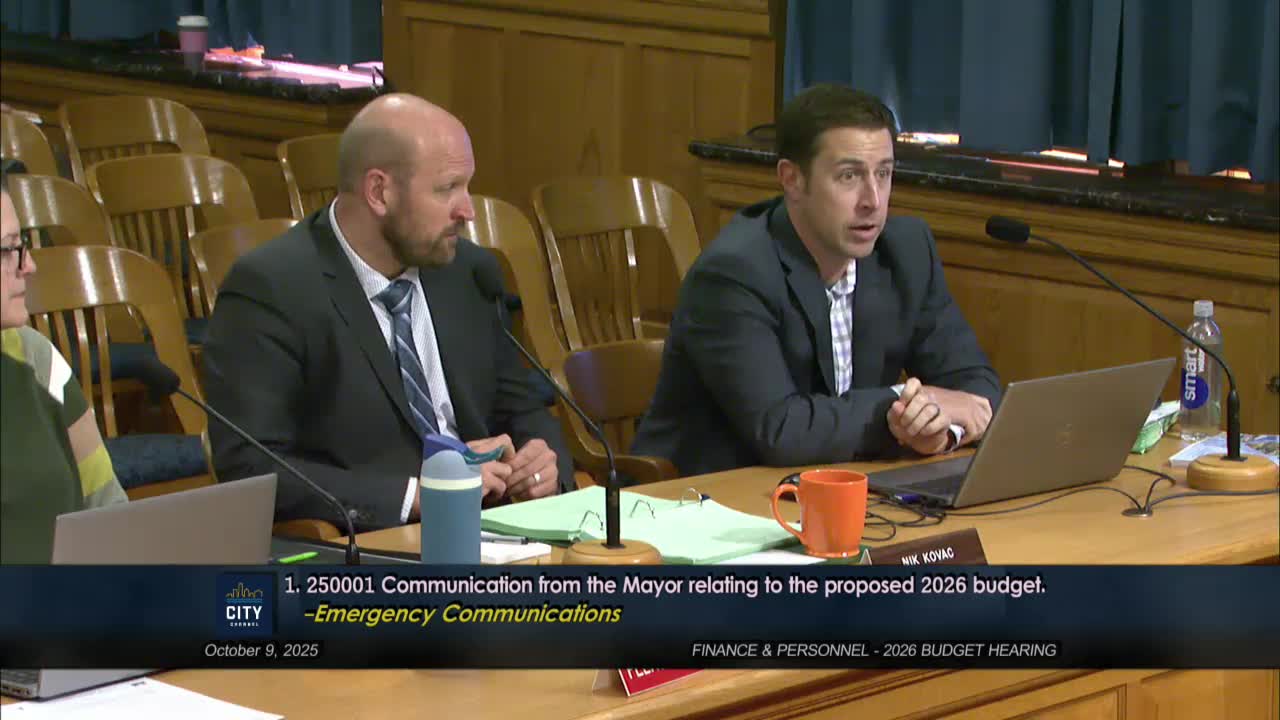Emergency Communications presents 2026 budget; highlights 9-1-1 universal call-taker training, QA and text-to-911 rollout
Get AI-powered insights, summaries, and transcripts
Subscribe
Summary
The Department of Emergency Communications told the Finance & Personnel Committee on Oct. 9 that its proposed 2026 budget of $27.2 million is essentially flat and that the department is focused on rolling out universal call-taker training, full-call quality assurance and a text-to-911 capability pending a vendor upgrade.
The Finance & Personnel Committee continued the Oct. 9 hearing with the Department of Emergency Communications (DEC) following the Milwaukee Police Department presentation. DEC Director Tony Bueno and deputy and finance staff told the committee the 2026 proposed budget is largely flat at $27.2 million, funds roughly 230 authorized full-time positions and prioritizes investments in training, quality assurance, bilingual capability and technology upgrades including text-to-911.
"We've streamlined 9-1-1 operations by eliminating the need to transfer medical calls to a different dispatcher," Director Tony Bueno told the committee, describing the Universal Call Taker (UCT) initiative that trains new hires to handle multiple call types and reduces dispatch time for medical calls.
Why it matters: Communications centers are a key "force multiplier" for first responders and are critical to emergency medical and fire dispatch performance. Committee members asked detailed questions about abandoned-call rates, bilingual capacity and the timing of a text-to-911 rollout.
Key points from DEC's presentation Budget and staffing. Budget staff reported the 2026 proposed DEC budget at $27.2 million, a modest 0.3 percent increase over 2025. The department is funded for about 240 positions and reported being staffed at roughly 83 percent (about 200 filled positions). The budget includes a higher personnel-cost adjustment (PCA) and transfers maintenance costs for the computer-aided dispatch (CAD) system into operations now that the project is live.
Universal Call Taker (UCT) and training. DEC said it began a UCT training program in January to have single-call takers handle law, fire and medical calls without transfer. The department said UCTs already reduced medical dispatch time by approximately 23 seconds compared with prior practice; DEC reported 31 fully trained UCTs with more staff in training and promotion. The department described more standardized, multi-stage training curriculum and said the UCT model will be the baseline for future classes.
Quality assurance and comms-coach roll-out. DEC told the committee it is implementing a tool (CommsCoach) that will allow the center to quality-assure nearly 100 percent of calls rather than sampling a small handful per week. DEC staff said the tool would reduce supervisor QA workload and enable targeted, scenario-based re-training and will be introduced in November.
Accreditation, standards and performance. DEC confirmed it is pursuing formal accreditation and certification under national standards (NENA/APCO/IAED/CALEA) and said it will expand performance metrics beyond 9-1-1 answer times to include call-creation and dispatch intervals, certification compliance and operational efficiency.
Text-to-911, translation and bilingual capacity. DEC is funded for text-to-911 and said it expects a vendor software upgrade to enable the feature; staff said the upgrade is funded and they are awaiting the vendor's release. The department reported four bilingual positions budgeted for eight, and that it uses a language-line service to handle more than 35 languages; Spanish is the most common, and staff said the center also sees Rohingya, Burmese and Hmong calls.
AI and data governance. DEC told the committee it is evaluating AI solutions for non-emergency call handling and for quality-assurance automation, but officials emphasized data-governance and retention concerns. DEC said any AI solution would need to preserve call data under city control and comply with HIPAA, CJIS and other legal standards before deployment.
Vendor and telecom issues. Committee members asked about delays in features such as abandoned-call auto-callback and text-to-911. DEC said some vendor modules were late and department staff are working with vendor leadership; Director Bueno told the committee he was actively pursuing contract and performance remedies and alternatives where vendor performance lagged. Committee members asked for follow-up memos on vendor status, contingency options and timelines for text-to-911 and abandoned-call handling.
Community engagement and public education. DEC staff said they increased public outreach in 2025 by visiting schools, partnering with Boys & Girls Club and by participating in neighborhood "Night Out" events to teach children (and parents) how and when to call 9-1-1. Staff also reported a program in which shelter and rescue partners bring dogs to the center for adoption social posts; DEC said all 16 dogs who visited were adopted.
What the committee asked for and next steps Alderpersons requested written follow-ups detailing vendor remediation steps and an expected timetable for text-to-911 and abandoned-call callback functionality. They also asked for more detail on bilingual recruitment, staffing levels and metrics that show how UCT training reduces dispatch time. The committee held the DEC item to the call of the chair to allow follow-up reporting from DEC and the budget office.
Ending DEC leaders said the department would continue to prioritize hiring, training, quality assurance and data-governance policy to support 24/7 emergency communications and to enable future accreditation and alternative-response work.
